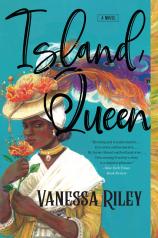Island Queen
Review
Island Queen
Those who start life with nothing and eventually become wealthy have nothing on Dorothy Kirwan Thomas, who started with less than nothing but became an extremely rich and powerful woman in her own right. Dolly, as she was known, was born a slave. Her father, an Irish plantation owner, taught her numbers and the value of money. Dolly was determined to earn enough to free herself, her mother and her sister. She ended up accomplishing that and so much more.
Vanessa Riley’s ISLAND QUEEN is not for the faint of heart. Rape, incest, violence against women and men, wanton cruelty, the deaths of children --- all are represented in events that happen in this weighty novel, which opens in London in 1824. Dorothy Kirwan Thomas is trying to gain an audience with an important British official in an effort to change the unfair tax laws of Demerara, a British colony. Riley then takes us back to 1761, to the island of Montserrat, where Dolly lives with her mother, Mamaí, and her sister, Kitty, in a hut near her father's plantation house. It's the night of the revolution, actually the first of many.
"This is a story of subjugation but also of triumph. And make no mistake about it, Dolly is triumphant in the end."
Each chapter's heading tells us where the story is set and when. It's important to keep track because Riley takes us forward and backward in time. Some chapters are contiguous and others skip years, so pay attention. The time division works well to enhance Dolly's journey for us because we know that she ends up wealthy enough to be a benefactor to a school for "colored" children, while we are reading about her life of deprivation at her father's plantation. Riley lures us with the knowledge that this illiterate slave somehow becomes an incredible success.
The novel is told in the first person, so we know what Dolly is thinking and why she makes certain decisions. On the plantation where she was born, she will only look on the right side, which contains huts and homes; the left side is for stocks, punishment and death. There is the relationship (or lack thereof) between Dolly and her half-brother, Nicholas, an evil child who grows up to be a despicable person and abuses his sister, among others.
There are numerous other conflicts here: the local conflict between the slaves, who are desperate to obtain their freedom, and the plantation owners, who need their free labor to survive and are horribly abusive to them; the religious conflict between the slaves who were taught Catholicism and the British who were practicing Anglicans; and the global conflict between the French and the British, which starts with the Seven Years’ War and continues through the War of 1812 as time goes on. And, of course, there is the conflict with those who are white and those who are not.
We come to admire Dolly as we see how hard she works to earn money for her freedom and that of her family. She faces so many obstacles to getting ahead in life, including being a mother while still a child herself because of rape. Still, her determination to succeed drives her to work harder and be smarter. She is lucky to have the support of her mother and sister, and is completely focused on succeeding so that she will be able to protect them. While she has romantic relationships, she will not let those deter her from her goal.
It's heartrending to hear about the prejudice that existed back then, and we realize that while some things have changed, the very nature of discrimination based on the color of one’s skin is as strong now as it was over 300 years ago: “Yet it was not hard to see the sneers, the fluttering of fans my dark flesh caused until my coins silenced them. Would there ever be a place where nothing but talents and love mattered?" Despite being treated differently because of her complexion, Dolly praises her ebony skin and calls it beautiful. This is a story of subjugation but also of triumph. And make no mistake about it, Dolly is triumphant in the end.
Reviewed by Pamela Kramer on August 13, 2021
Island Queen
- Publication Date: June 14, 2022
- Genres: Fiction, Historical Fiction, Women's Fiction
- Paperback: 608 pages
- Publisher: William Morrow Paperbacks
- ISBN-10: 006300285X
- ISBN-13: 9780063002852




